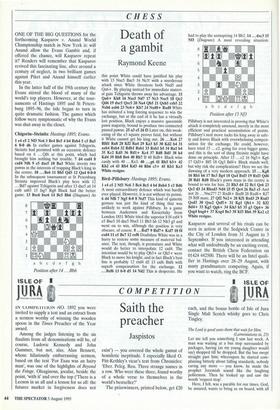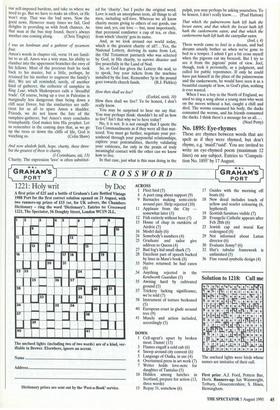iiSLE OF I j SISGLE HALT SCOTCH ISMISKT
URA
I ISLE OF
MT SCOTCH %HMI
COMPETITION
Saith the preacher
Jaspistos
EN COMYE 11110N NO. 1892 you were invited to supply a text and an extract from a sermon worthy of winning the wooden spoon in the Times Preacher of the Year award.
Among the judges listening to the six finalists from all denominations will be, of course, Ludovic Kennedy and John Gummer, but not, alas, Alan Bennett, whose hilariously embarrassing sermon, based on the text Tor Esau was an hairy man', was one of the highlights of Beyond the Fringe. Oleaginous, jocular, beside the point, 'with it' and over the top (There is a Leeson in us all and a lesson for us all: the futures market in forgiveness does not exist') — you covered the whole gamut of homiletic ineptitude. I especially liked 0. Pitt-Kethley's vicar's text from Chronicles: `Eber. Peleg. Reu. Three strange names in a row. Who were these three, found worthy of a whole verse to themselves in the world's bestseller?'
The prizewinners, printed below, get £20 each, and the bonus bottle of Isle of Jura Single Malt Scotch whisky goes to Chris Tingley.
The Lord is good unto them that wait for Him.
(Lamentations ii4 25) Let me tell you something I saw last week. A man was waiting at a bus stop surrounded by packages, having (as my young daughter would say) shopped till he dropped. But the bus swept straight past him; whereupon he started com- plaining bitterly about falling standards, nobody caring any more — you know, he made the prophet Jeremiah sound like the laughing policeman. Then he looked up and saw the words 'request stop'.
Here, I felt, was a parable for our times. God, be assured, wants to bring us on board, with all our self-imposed burdens, and take us where we need to go. But we have to make an effort, or He won't stop. That was the bad news. Now the good news. However many times we fail, God delights in providing us with fresh chances. As that man at the bus stop found, there's always another one coming along. (Chris Tingley) I was an herdman and a gatherer of sycamore fruit.
Amos's words in chapter viii, verse 14 are famil- iar to us all. Amos was a wiry man, his ability to clamber into the uppermost branches the envy of his fellows. Most of the precious fruit he took back to his master, but a little, perhaps, he retained for his mother to augment the family's diet. We are all reminded, surely, of another kind of gatherer, the collector of samphire in King Lear, which Shakespeare calls a 'dreadful trade'. Of course, being up a tree in Palestine is marginally less dangerous than being down a cliff near Dover, but the similarities are suffi- cient for us all to spare Amos a shudder. Friends, we do not know the fate of the samphire-gatherer, but Amos's story concludes triumphantly. God makes him His prophet. Let us remember in the coming days that, as we go up the trees or down the cliffs of life, God is
watching us. (Colin Shaw) And now abideth faith, hope, charity, these three: but the greatest of these is charity.
(1 Corinthians, xiii, 13) Charity. The expression 'love' is often substitut- ed for 'charity', but I prefer the original word. Love is such an amorphous term, all things to all men, including self-love. Whereas we all know charity means giving to others of our goods, our time and, yes, our love — but, most importantly, that perennial comforter a cup of tea, or char, from which 'charity' gets its name.
And, as we look around our world today, which is the greatest charity of all?... Yes, the National Lottery, deriving its name from Lot, the Old Testament patriarch who was selected by God, in His charity, to survive disaster and live peacefully in the Land of Nod.
So, as God has given the Lottery the nod, so to speak, buy your tickets from the machine installed by the font. Remember 5p in the pound goes towards church funds. (R.J. Pickles) How then shall we live?
(Ezekiel, mill, 10) How then shall we live? To be honest, I don't really know.
You may be surprised to hear me say that. You may perhaps think: shouldn't he tell us how to live? Isn't that why we're here today?
No, it is not. It is not enough that I quote the Ten Commandments as if they were all that mat- tered. You must go further, negotiate your per- sonhood through your purposeful relationships, explore your potentialities, thereby validating your existence, for only in the praxis of truly meaningful contact with the other can we know how to live.
In that case, just what is this man doing in the pulpit, you may perhaps be asking yourselves. To be honest, I don't really know.... (Paul Hatton) That which the palmenvorin hath left hath the locust eaten; and that which the locust hath left hash the cankerworm eaten; and that which the cankerworm hath left hath the caterpillar eaten.
(Joel, i, 4) These words came to Joel in a dream, and bad dreams usually bother us when we've gone to bed in a temper. I admit I get a bit cross myself when the pigeons eat my broccoli. But I try to see it from the pigeons' point of view. Joel, though, took it personally, as a judgment, and called for public repentance. If only he could have put himself in the place of the palmerworm and the cankerworm, he would have seen it as a beautiful example of how, in God's plan, nothing is ever wasted.
When I was a boy in the North of England, we used to sing a song about a young man who went on the moors without a hat, caught a chill and died. The worms consumed his body, the ducks consumed the worms, and his friends consumed the ducks. I think there's a message for us (Noel Petty)
No. 1895: Eye-rhymes
These are rhymes between words that are spelt as if they were rhymed, but don't rhyme, e.g. 'maid'/'said'. You are invited to write an eye-rhymed poem (maximum 12 lines) on any subject. Entries to 'Competi- tion No. 1895' by 17 August.



















































 Previous page
Previous page